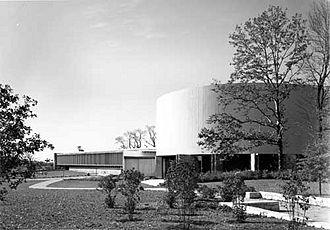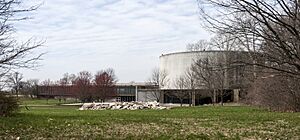Cyclorama Building at Gettysburg facts for kids
Quick facts for kids Cyclorama Building |
|
|---|---|

Cyclorama Building in Zeigler's Grove
|
|
| General information | |
| Architectural style | Modernist (Mission 66) |
| Location | Zeigler's Grove |
| Address | 125 Taneytown Road Gettysburg Battlefield |
| Town or city | Gettysburg, Pennsylvania |
| Country | United States |
| Coordinates | 39°48′56.8″N 77°14′2.9″W / 39.815778°N 77.234139°W |
| Construction started | 1958 |
| Completed | 1962 |
| Inaugurated | November 19, 1962 |
| Demolished | March 8–9, 2013 |
| Cost | $687,349 |
| Owner | Gettysburg National Military Park |
| Design and construction | |
| Architect | Richard Neutra |
| Main contractor | Orndorff Construction Company, Inc. |
The Cyclorama Building at Gettysburg was a special building made of concrete and glass. It was built in a style called modernist. The National Park Service (NPS) opened it on November 19, 1962. This building was part of a program called Mission 66. It served as a visitor center for the Gettysburg Battlefield.
Inside, visitors could see a huge painting called a cyclorama. This painting showed the famous Battle of Gettysburg from 1883. It was created by Paul Philippoteaux. The building also displayed other items from the battle. It even had an observation deck. This deck replaced an older tower from 1896. The Cyclorama Building was taken down in 2013.
Contents
History of the Cyclorama Building
Designing the Building
The famous architect Richard Neutra was chosen to design the Cyclorama Building. He started working on the plans in 1958. His design included a main office for the park. It also had a special space for the large cyclorama painting. Before this, the painting was kept in a different location. The building also featured an auditorium. This auditorium could open up to the nearby lawn. Neutra even called his design "the Abraham Lincoln Shrine of the Nation."
Building and Opening the Center
In 1959, Orndorff Construction Company, Inc., won the contract to build it. Their bid was $687,349. The building was placed at Ziegler's Grove. This spot was chosen to connect the painting closely to the actual battle location. The total cost to build it was $959,603. The Cyclorama Building was officially opened on November 19, 1962. This date was special because it was the 99th anniversary of the Gettysburg Address.
Changing Views and Debates
As time went on, ideas about how to present battlefields changed. The National Park Service wanted to remove modern buildings from important historical sites. In 1977, a federal group suggested moving the Cyclorama Building. They thought it should be in a less central part of the battlefield.
Requests to fix up the building were turned down in 1993 and 1996. However, in 1998, an important official disagreed. The Keeper of the National Register of Historic Places said the building was "exceptionally important" for its history and design. This meant it could be listed on the National Register of Historic Places. This decision went against what the National Park Service had said earlier.
In 1999, another group, the U.S. Commission of Fine Arts, also spoke out. They were against tearing down the building. Dion Neutra, Richard Neutra's son, also worked on the building's design. He started a campaign to save it. He received over a thousand letters of support. Famous architect Frank Gehry wrote that Neutra's building was very important. He said it "deserves the highest appreciation of ours." The American Institute of Architects called the Cyclorama "one of the most important buildings" built by the Park Service in the 20th century.
Closing and Demolition
In 2005, the Gettysburg Cyclorama painting was taken out of the building. It needed to be restored and was later moved. The building was then closed to the public.
In 2010, a court ruled that the National Park Service had not followed the rules. They needed to study the effects of tearing down the building. They also had to find other options. In August 2012, the Park Service finished their study. They decided that tearing down the building was the best choice. In January 2013, they announced plans to demolish it. There was a protest in February 2013.
Finally, in March 2013, the Cyclorama Building was torn down. The National Trust for Historic Preservation listed it as one of ten important historic sites lost that year.
 | Frances Mary Albrier |
 | Whitney Young |
 | Muhammad Ali |


